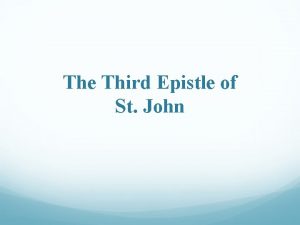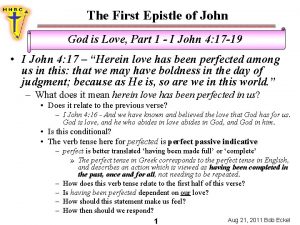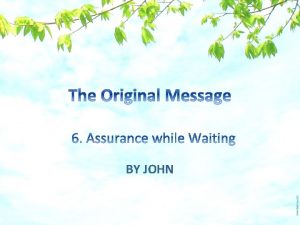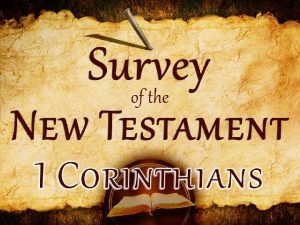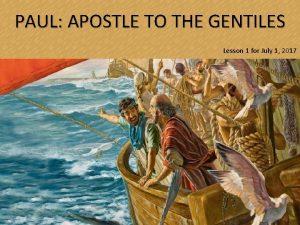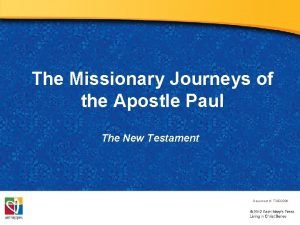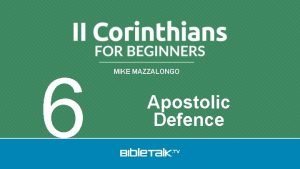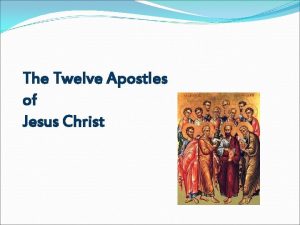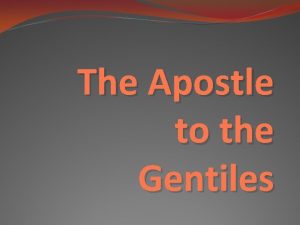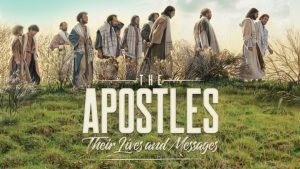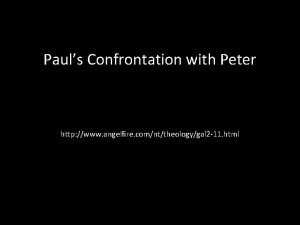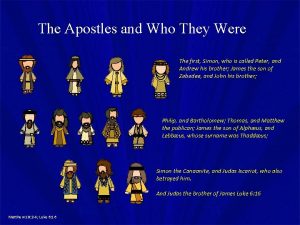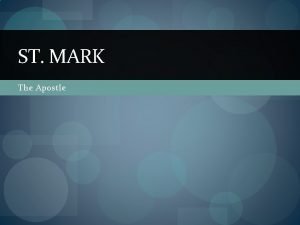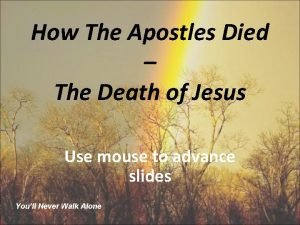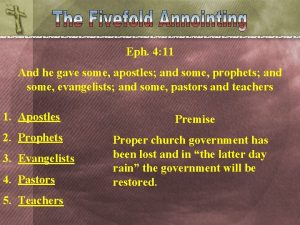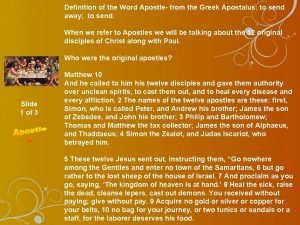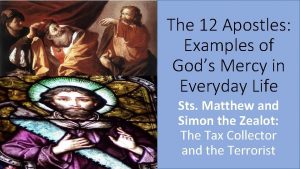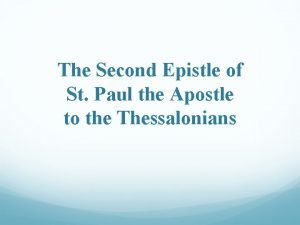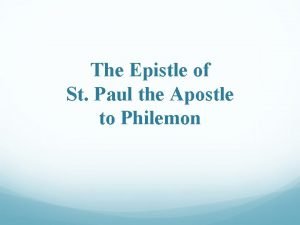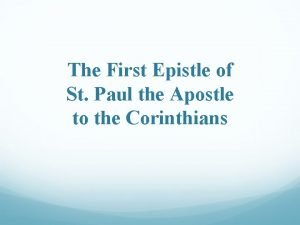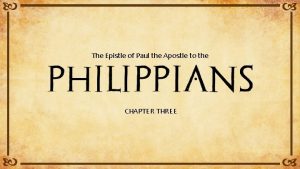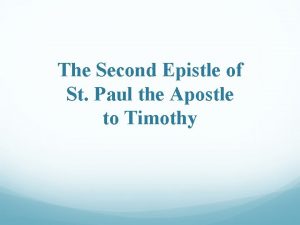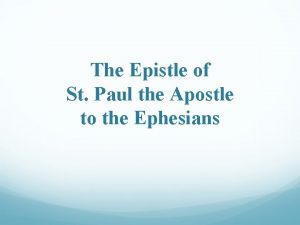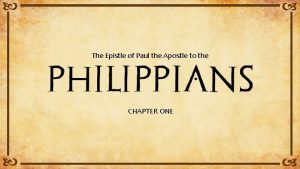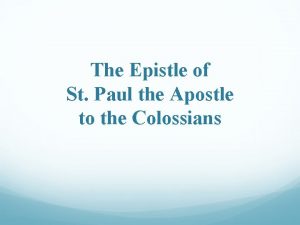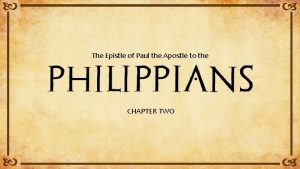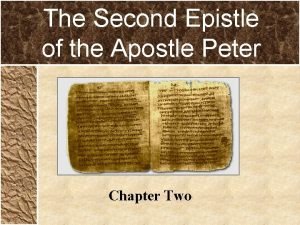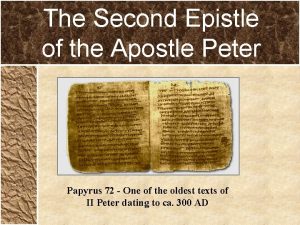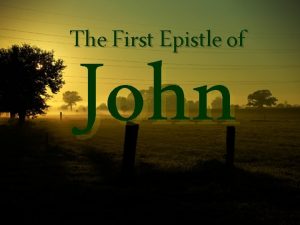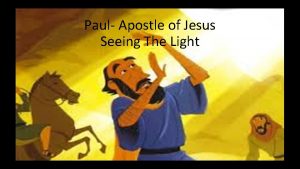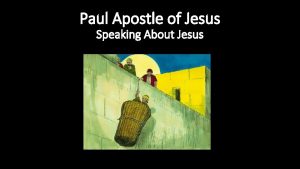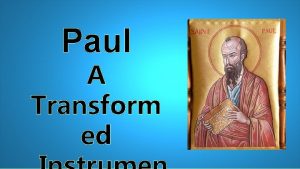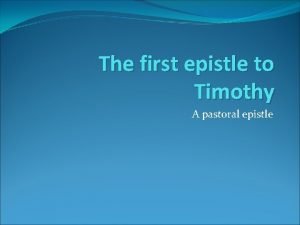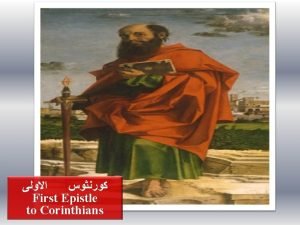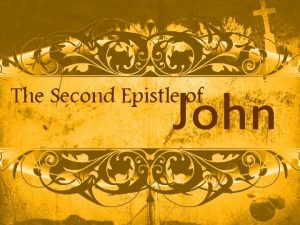The Epistle of St Paul the Apostle to






























- Slides: 30

The Epistle of St. Paul the Apostle to the Philippians

The Epistle to the Philippians The City of Philippi: + A city in the region of Macedonia, in Greece. Its old name was ‘Krinides. ’ + The city was inside the borders which Philip, king of Macedon annexed to his kingdom in 356 B. C. He expanded the city and named it after himself. + In the year 168 B. C. , the Romans conquered the city. Later on, Roman settlers were sent there and it became a colony enjoying the rights and privileges of the Romans. + The city was mentioned in the book of Acts as the foremost, according to importance or because it is the first city a traveler reaches by the sea:

The Epistle to the Philippians “And from there to Philippi, which is the foremost city of that part of Macedonia, a colony. And we were staying in that city for some days” (Acts 16: 12) St Paul’s Visits to Philippi and the Institution of its Church: + The Lord called St. Paul to preach in the Macedonian region: “And a vision appeared to Paul in the night. A man of Macedonia stood and pleaded with him, saying: Come over to Macedonia and help us. Now after he had seen the vision, immediately we sought to go to Macedonia, concluding that the Lord had called us to preach the gospel to them” (Acts 16: 9 -10) 1. The church of Philippi was established by the hands of St. Paul the apostle during his 2 nd missionary trip, where he went to Philippi around…

The Epistle to the Philippians the year A. D. 52. + It was the first church to be founded in Europe. In this trip, St. Paul was accompanied by Silas and Timothy and they stayed in the city for several days. + It is evident here that Philippi had no synagogues for St. Paul met the Jews of the city at the place where they used to meet and pray: “And on the Sabbath day we went out of the city to the riverside, where prayer was customarily made; and we sat down and spoke to the women who met there” (Acts 16: 13) + The first to accept the faith in this city was a woman by the name of Lydia, a purple dye merchant from Thyatira:

The Epistle to the Philippians “Now a certain woman named Lydia heard us. She was a seller of purple from the city of Thyatira, who worshiped God. The Lord opened her heart to heed the things spoken by Paul. And when she and her household were baptized, she begged us, saying: If you have judged me to be faithful to the Lord, come to my house and stay. So she persuaded us” (Acts 16: 14 -15) + A slave girl woman possessed with a spirit of divination then met them: “Now it happened, as we went to prayer, that a certain slave girl possessed with a spirit of divination met us, who brought her masters much profit by fortunetelling. This girl followed Paul and us, and cried out, saying: These men are the servants of the Most High God, who proclaim to us the way of salvation. And this she did for many days. But Paul, greatly annoyed, turned and said to the spirit: I command you in the name of Jesus Christ to come out of her. And he came out that very hour” (Acts 16: 16 -18)

The Epistle to the Philippians - Certainly, this evil spirit was not sincere about his goals. For his witness of the apostle and his service carried in it his deception. He is pushing people to have faith in this evil spirit, and thus they become under his rule. - Also, Satan’s witness to the apostle carries in it the danger of faith through believing the witness of Satan and accepting it. Accordingly, St. Paul rejected Satan’s witness as Christ rejected it. Therefore, we should not accept Satan’s witness, nor seek him, and we should reject everything he utters even if it is true, for he does so for the sake of our deception and misleading, even through a part of the truth. + As a result of the divination spirit’s parting from the slave girl, her masters were resentful of St. Paul for they were divested of their profits. So, they seized the apostle and Silas and dragged them to the marketplace to the magistrates claiming that the two were troubling the…

The Epistle to the Philippians city and were calling of customs that do not agree with those of the Romans. They were jailed and their feet were fastened to the stocks. After that, a great earthquake opened the doors of the prison: “But at midnight Paul and Silas were praying and singing hymns to God, and the prisoners were listening to them. Suddenly there was a great earthquake, so that the foundations of the prison were shaken; and immediately all the doors were opened and everyone’s chains were loosed” (Acts 16: 25 -26) + The jailer then believed in Christ and was baptized along with his family: “Sirs, what must I do to be saved? So they said: Believe on the Lord Jesus Christ, and you will be saved, you and your household. Then they spoke the word of the Lord to him and to all who were in his house. And he…

The Epistle to the Philippians took them the same hour of the night and washed their stripes. And immediately he and all his family were baptized” (Acts 16: 30 -33) 2. St. Paul visited this church a second time during his 3 rd missionary trip in the year A. D. 57 as he went to Macedonia from Ephesus: “After the uproar had ceased, Paul called the disciples to himself, embraced them, and departed to go to Macedonia” (Acts 20: 1) 3. The third visit was in the year A. D. 58 during his return from his 3 rd missionary trip. From Corinth, he passed through Philippi and Troas to reach Jerusalem: “And when the Jews plotted against him as he was about to sail to Syria, …

The Epistle to the Philippians he decided to return through Macedonia” (Acts 20: 3, 6) 4. The fourth visit was probably in A. D. 63 after his release from his 1 st imprisonment in Rome, where his epistle to the Philippians points to his reaching to Philippi after his release: “That your rejoicing for me may be more abundant in Jesus Christ by my coming to you again” (Philippians 1: 26) 5. His fifth trip there was in the year A. D. 64 -65, as he wrote his 1 st epistle to Timothy from Macedonia: “As I urged you when I went into Macedonia—remain in Ephesus that you may charge some that they teach no other doctrine” (1 Timothy 1: 3)

The Epistle to the Philippians + All of the previous explain and reveal the strong attachment that was there between St. Paul and the Philippians. + The church of Philippi faced terrible persecution, and though she was poor, she abundantly shared in the needs of the church in Jerusalem: “Moreover, brethren, we make known to you the grace of God bestowed on the churches of Macedonia: that in a great trial of affliction the abundance of their joy and their deep poverty abounded in the riches of their liberality. For I bear witness that according to their ability, yes, and beyond their ability, they were freely willing, imploring us with much urgency that we would receive the gift and the fellowship of the ministering to the saints” (2 Corinthians 8: 1 -4)

The Epistle to the Philippians Time and Place of Writing: + St. Paul wrote this letter from Rome during his 1 st imprisonment. And it is probable that he was guarded by the Emperor’s guards in Caesar’s house: “Because I have you in my heart, inasmuch as both in my chains and in the defense and confirmation of the gospel” (Philippians 1: 7) “So that it has become evident to the whole palace guard, and to all the rest, that my chains are in Christ; and most of the brethren in the Lord, having become confident by my chains, are much more bold to speak the word without fear” (Philippians 1: 13 -14)

The Epistle to the Philippians “The former preach Christ from selfish ambition, not sincerely, supposing to add affliction to my chains” (Philippians 1: 16) “All the saints greet you, but especially those who are of Caesar’s household” (Philippians 4: 22) + It is likely that the epistle was written in A. D. 63 or near the end of his imprisonment: “But I trust in the Lord that I myself shall also come shortly” (Philippians 2: 24) + The epistle was written by the hands of Epaphroditus.

The Epistle to the Philippians + It is to be noted that this epistle, together with the epistle to the Ephesians, the epistle to the Colossians and that to Philemon are collectively known as ‘The Epistles of Captivity. ’ Characteristics of the Epistle: + In this epistle, St. Paul points out personal matters, where in depth he discusses his spiritual condition and his personal feelings. + The epistle is not argumentative in nature. Also, it is void of any rebuke or reprove, but on the contrary, it was written with the spirit of gratitude and honor to the Philippians.

The Epistle to the Philippians Purpose of Writing: 1. To Express the Apostle’s Joy and Gratitude to the Generosity of the Church at Philippi, for the Gifts they Sent to him in Rome by the Hand of Epaphroditus: “Indeed I have all and abound. I am full, having received from Epaphroditus the things sent from you, a sweet-smelling aroma, an acceptable sacrifice, well pleasing to God” (Philippians 4: 18) 2. St. Paul sent Epaphroditus to them with this Letter when he saw how Concerned they were about the latter’s Sickness: “Yet I considered it necessary to send to you Epaphroditus, my brother, fellow worker, and fellow soldier, but your messenger and the one who ministered to my need; since he was longing for you all, and was…

The Epistle to the Philippians distressed because you had heard that he was sick. For indeed he was sick almost unto death; but God had mercy on him, and not only on him but on me also, lest I should have sorrow upon sorrow. Therefore I sent him the more eagerly, that when you see him again you may rejoice, and I may be less sorrowful” (Philippians 2: 25 -28) 3. To Comfort them concerning his Situation as a Prisoner for Christ, Advising them to Unite in Spirit and to Rejoice: “But I want you to know, brethren, that the things which happened to me have actually turned out for the furtherance of the gospel” (Philippians 1: 12)

The Epistle to the Philippians Theme of the Epistle: + There is one keynote that resounds again and again throughout the epistle. That keynote is: ‘Joy. ’ Four times the word ‘joy’ is found, and the verb ‘to rejoice’ occurs ten times. “Therefore, my beloved and longed-for brethren, my joy and crown, so stand fast in the Lord, beloved” (Philippians 4: 1) “Rejoice in the Lord always. Again I will say, rejoice!” (Philippians 4: 4) - For this reason, the epistle to the Philippians has often been called Paul's ‘hymn of joy, ’ in which theme is:

The Epistle to the Philippians ‘Rejoice in the Lord!’. + What were the Causes of this Joy? 1. The word joy and its synonyms were accompanied by hardships. This was the case with the apostle and his companion Silas when they were imprisoned in Philippi. They were praising God in the middle of the night after being flogged and their blood was pouring. 2. He was also happy when he was shackled by chains in Rome, for his restraints expanded the circle of preaching the gospel. As such, He induced the believers in Philippi to be joyful for they were granted to partake of Christ’s sufferings: “For to you it has been granted on behalf of Christ, not only to believe in Him, but also to suffer for His sake, having the same conflict which you…

The Epistle to the Philippians saw in me and now hear is in me” (Philippians 1: 29 -30) 3. The church at Philippi had been a source of great joy to Paul by virtue of their fellowship with him in the proclamation of the gospel: “Always in every prayer of mine making request for you all with joy, for your fellowship in the gospel from the first day until now, being confident of this very thing, that He who has begun a good work in you will complete it until the day of Jesus Christ” (Philippians 1: 4 -6) 4. He was happy for their service as they helped his financial needs: “But I rejoiced in the Lord greatly that now at last your care for me has flourished again; though you surely did care, but you lacked opportunity” (Philippians 4: 10)

The Epistle to the Philippians 5. And above all, he was rejoicing in the Lord Jesus. Contents: I. Introduction: (Ch. 1) 1. Salutation: “To all the saints in Christ Jesus who are in Philippi, with the bishops and deacons: Grace to you and peace from God our Father and the Lord Jesus Christ” (Philippians 1: 1 -2) 2. Thankfulness and Prayer: “I thank my God upon every remembrance of you” (Philippians 1: 3)

The Epistle to the Philippians II. Discussion of the Benefits of Imprisonment to the Preaching of the Gospel: (Ch. 1) 1. Furtherance of the Gospel In Spite of the Apostle’s Imprisonment: “Some indeed preach Christ even from envy and strife, and some also from goodwill… What then? Only that in every way, whether in pretense or in truth, Christ is preached; and in this I rejoice, yes, and will rejoice” (Philippians 1: 15, 18) 2. St. Paul’s Expectation of Deliverance: “For to me, to live is Christ, and to die is gain. But if I live on in the flesh, this will mean fruit from my labor; yet what I shall choose I cannot tell. For I am hardpressed between the two, having a desire to depart and be with Christ, which is far better” (Philippians 1: 21 -23)

The Epistle to the Philippians “Nevertheless to remain in the flesh is more needful for you. And being confident of this, I know that I shall remain and continue with you all for your progress and joy of faith” (Philippians 1: 24 -25) III. Practical Advises: (Chs. 1 -2) 1. Striving and Suffering for Christ: “Only let your conduct be worthy of the gospel of Christ, so that whether I come and see you or am absent, I may hear of your affairs, that you stand fast in one spirit, with one mind striving together for the faith of the gospel, and not in any way terrified by your adversaries, which is to them a proof of perdition, but to you of salvation, and that from God” (Philippians 1: 27 -28)

The Epistle to the Philippians 2. Exhortation to Unity through Humility: “Fulfill my joy by being like-minded, having the same love, being of one accord, of one mind. Let nothing be done through selfish ambition or conceit, but in lowliness of mind let each esteem others better than himself” (Philippians 2: 2 -3) “Let each of you look out not only for his own interests, but also for the interests of others” (Philippians 2: 4) “Let this mind be in you which was also in Christ Jesus, who, being in the form of God, did not consider it robbery to be equal with God, but made Himself of no reputation, taking the form of a bondservant, and coming in the likeness of men. And being found in appearance as a man, He…

The Epistle to the Philippians humbled Himself and became obedient to the point of death, even the death of the cross” (Philippians 2: 5 -8) 3. Working Out their Own Salvation: “Work out your own salvation with fear and trembling; for it is God who works in you both to will and to do for His good pleasure” (Philippians 2: 12 -13) “Do all things without complaining and disputing, that you may become blameless and harmless, children of God without fault in the midst of a crooked and perverse generation, among whom you shine as lights in the world, holding fast the word of life, so that I may rejoice in the day of Christ that I have not run in vain or labored in vain” (Philippians 2: 14 -16)

The Epistle to the Philippians IV. Plans Involving Timothy and Epaphroditus: (Ch. 2) 1. Sending Timothy Soon: “But I trust in the Lord Jesus to send Timothy to you shortly, that I also may be encouraged when I know your state. For I have no one like-minded, who will sincerely care for your state. For all seek their own, not the things in Christ Jesus. But you know his proven character, that as a son with his father he served with me in the gospel” (Philippians 2: 19 -22) 2. Sending Epahroditus At Once: “Receive him therefore in the Lord with all gladness, and hold such men in esteem; because for the work of Christ he came close to death, not regarding his life, to supply what was lacking in your service toward me” (Philippians 2: 29 -30)

The Epistle to the Philippians V. Pinpointing the Error of Placing Confidence in Fleshly Accomplishments: (Ch. 3) 1. Warning Against the Judaizers: “Beware of dogs, beware of evil workers, beware of the mutilation!” (Philippians 3: 2) “For we are the circumcision, who worship God in the Spirit, rejoice in Christ Jesus, and have no confidence in the flesh” (Philippians 3: 3) 2. Counting All as Loss for the Surpassing Value of Knowing Christ: “Though I also might have confidence in the flesh. If anyone else thinks he may have confidence in the flesh, I more so: circumcised the eighth day, …

The Epistle to the Philippians of the stock of Israel, of the tribe of Benjamin, a Hebrew of the Hebrews; concerning the law, a Pharisee; concerning zeal, persecuting the church; concerning the righteousness which is in the law, blameless” (Philippians 3: 4 -6) “But what things were gain to me, these I have counted loss for Christ. Yet indeed I also count all things loss for the excellence of the knowledge of Christ Jesus my Lord, for whom I have suffered the loss of all things, and count them as rubbish, that I may gain Christ and be found in Him, not having my own righteousness, which is from the law, but that which is through faith in Christ, the righteousness which is from God by faith; that I may know Him and the power of His resurrection, and the fellowship of His sufferings, being conformed to His death, if, by any means, I may attain to the resurrection from the dead” (Philippians 3: 7 -11)

The Epistle to the Philippians VI. Pressing Towards the Goal: (Ch. 3) “Not that I have already attained, or am already perfected; but I press on, that I may lay hold of that for which Christ Jesus has also laid hold of me” (Philippians 3: 12) “Brethren, I do not count myself to have apprehended; but one thing I do, forgetting those things which are behind and reaching forward to those things which are ahead, I press toward the goal for the prize of the upward call of God in Christ Jesus” (Philippians 3: 13 -14) “Brethren, join in following my example, and note those who so walk, as you have us for a pattern” (Philippians 3: 17)

The Epistle to the Philippians “For our citizenship is in heaven, from which we also eagerly wait for the Savior, the Lord Jesus Christ, who will transform our lowly body that it may be conformed to His glorious body, according to the working by which He is able even to subdue all things to Himself” (Philippians 3: 20 -21) VI. Advices on Unity, Joy and Peace: (Ch. 4) “I implore Euodia and I implore Syntyche to be of the same mind in the Lord” (Philippians 4: 2) “Be anxious for nothing, but in everything by prayer and supplication, with thanksgiving, let your requests be made known to God; and the peace of God, which surpasses all understanding, will guard your hearts and minds through Christ Jesus” (Philippians 4: 6 -7)

The Epistle to the Philippians “The things which you learned and received and heard and saw in me, these do, and the God of peace will be with you” (Philippians 4: 9) VII. Thanksgiving for their Generosity: (Ch. 4) 1. Not in Regard to Need: “Not that I speak in regard to need, for I have learned in whatever state I am, to be content” (Philippians 4: 11) “I can do all things through Christ who strengthens me” (Philippians 4: 13) 2. Their Giving Abounds to their Own Account:

The Epistle to the Philippians “Now you Philippians know also that in the beginning of the gospel, when I departed from Macedonia, no church shared with me concerning giving and receiving but you only. For even in Thessalonica you sent aid once and again for my necessities. Not that I seek the gift, but I seek the fruit that abounds to your account” (Philippians 4: 15 -17) VIII. Ending: (Ch. 4) “Greet every saint in Christ Jesus. The brethren who are with me greet you” (Philippians 4: 21)
 The third epistle of st. john is addressed to________.
The third epistle of st. john is addressed to________. Epistle to the god of love
Epistle to the god of love ما هى رسائل الكاثوليكون
ما هى رسائل الكاثوليكون The last apostle
The last apostle Apostle paul's third missionary journey map
Apostle paul's third missionary journey map Paul the apostle to the gentiles
Paul the apostle to the gentiles The missionary journeys of the apostle paul
The missionary journeys of the apostle paul Mike mazzalongo statement of faith
Mike mazzalongo statement of faith Apostles creed methodist
Apostles creed methodist The apostle whose symbol is a fish lying on a bible
The apostle whose symbol is a fish lying on a bible St matthew the apostle church
St matthew the apostle church Apostle to the gentiles
Apostle to the gentiles Apostle definition
Apostle definition John mayer bio
John mayer bio Angelfire apostle
Angelfire apostle Bartholomew the apostle facts
Bartholomew the apostle facts Short bolting
Short bolting Was st mark an apostle
Was st mark an apostle Death of apostles of jesus
Death of apostles of jesus St peters apostle high school
St peters apostle high school Kateri tekakwitha facts
Kateri tekakwitha facts St thomas the apostle biography
St thomas the apostle biography Judas iscariot symbol
Judas iscariot symbol He gave some to be apostles
He gave some to be apostles Interesting facts about matthew the apostle
Interesting facts about matthew the apostle Apostle definition greek
Apostle definition greek How apostle peter died
How apostle peter died Which apostle was sawed in half
Which apostle was sawed in half Phối cảnh
Phối cảnh Một số thể thơ truyền thống
Một số thể thơ truyền thống Các châu lục và đại dương trên thế giới
Các châu lục và đại dương trên thế giới
